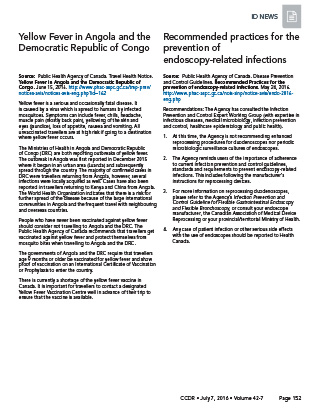ID News: July 2016

 Download this article as a PDF (64 KB - 1 page)
Download this article as a PDF (64 KB - 1 page)Published by: The Public Health Agency of Canada
Issue: Volume 42-7: Can we stop Measles?
Date published: July 7, 2016
ISSN: 1481-8531
Submit a manuscript
About CCDR
Browse
Volume 42-7, July 7, 2016: Can we stop Measles?
ID News
Yellow Fever in Angola and the Democratic Republic of Congo
Source: Public Health Agency of Canada. Travel Health Notice: Yellow Fever in Angola and the Democratic Republic of Congo (June 15, 2016).
Yellow fever is a serious and occasionally fatal disease. It is caused by a virus which is spread to humans by infected mosquitoes. Symptoms can include fever, chills, headache, muscle pain (mostly back pain), yellowing of the skin and eyes (jaundice), loss of appetite, nausea and vomiting. All unvaccinated travellers are at high risk if going to a destination where yellow fever occurs.
The Ministries of Health in Angola and Democratic Republic of Congo (DRC) are both reporting outbreaks of yellow fever. The outbreak in Angola was first reported in December 2015 where it began in an urban area (Luanda) and subsequently spread through the country. The majority of confirmed cases in DRC were travellers returning from Angola, however, several infections were locally acquired as well. Cases have also been reported in travellers returning to Kenya and China from Angola. The World Health Organization indicates that there is a risk for further spread of the disease because of the large international communities in Angola and the frequent travel with neighbouring and overseas countries.
People who have never been vaccinated against yellow fever should consider not travelling to Angola and the DRC. The Public Health Agency of Canada recommends that travellers get vaccinated against yellow fever and protect themselves from mosquito bites when travelling to Angola and the DRC.
The governments of Angola and the DRC require that travellers age 9 months or older be vaccinated for yellow fever and show proof of vaccination on an International Certificate of Vaccination or Prophylaxis to enter the country.
There is currently a shortage of the yellow fever vaccine in Canada. It is important for travellers to contact a designated Yellow Fever Vaccination Centre well in advance of their trip to ensure that the vaccine is available.
Recommended practices for the prevention of endoscopy-related infections
Source: Public Health Agency of Canada. Disease Prevention and Control Guidelines. Recommended practices for the prevention of endoscopy-related infections (May 24, 2016).
Recommendations: The Agency has consulted the Infection Prevention and Control Expert Working Group (with expertise in infectious diseases, medical microbiology, infection prevention and control, healthcare epidemiology and public health).
- At this time, the Agency is not recommending enhanced reprocessing procedures for duodenoscopes nor periodic microbiologic surveillance cultures of endoscopes.
- The Agency reminds users of the importance of adherence to current infection prevention and control guidelines, standards and requirements to prevent endoscopy-related infections. This includes following the manufacturer's instructions for reprocessing devices.
- For more information on reprocessing duodenoscopes, please refer to the Agency's Infection Prevention and Control Guideline for Flexible Gastrointestinal Endoscopy and Flexible Bronchoscopy, or consult your endoscope manufacturer, the Canadian Association of Medical Device Reprocessing or your provincial/territorial Ministry of Health.
- Any case of patient infection or other serious side effects with the use of endoscopes should be reported to Health Canada.